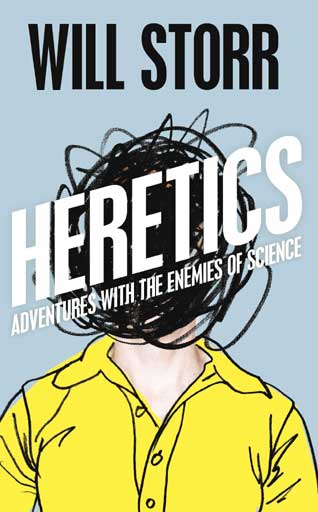
The Heretics: Adventures with the Enemies of Science by Will Storr (Picador)
Everybody – especially everybody reading a publication such as this – is pretty confident in the rightness of their opinions about why things are the way they are. However, nobody can be empirically correct about everything. Therefore, it seems reasonable to conclude that all of us are harbouring beliefs – deeply-held core beliefs, crucial to our personal understanding of the world and how we are best to make our way in it – about which we are as completely wrong as anyone who has ever subscribed to the flatness of the Earth, the clairvoyant properties of the constellations, or The Socialist Worker.
This is the contradiction which animates new book The Heretics by Will Storr. Storr is scarcely the first journalist to have taken an interest the delusional and deranged: Jon Ronson’s Them, David Aaronovitch’s Voodoo Histories and Louis Theroux’s The Call Of The Weird, fine works each, have all shone a wry, faintly superior rationalism upon people who choose to believe the controversial, unprovable, unsubstantiated or just plain howling-at-the-moon barmy. Storr’s book differs in humbly admitting the possibility that he doesn¹t know what he¹s talking about, either. His researches into the neurological and psychological underpinnings of what we believe, and why we believe it, are a bracing proof that we are all more or less winging it.
Storr meets many of those who have decided that overwhelming scientific evidence is no reason to concede a point: creationists, homeopaths, Holocaust deniers, alien abductees and conspiracy theorists, among others drawn from the legions of crackpots and dingbats you’d least wish to be cornered by at a party. The breadth of Storr’s travels in search of such cranks demonstrates that an insistence on believing the incredible is a universal human trait. Indeed, it’s arguably the universal human trait. But as his journey progresses, Storr begins to wonder if it’s a product of another hardwired human desire: the need to belong to a tribe.
Storr undergoes something of an epiphany when he finds himself among the likeliest potential purchasers of The Heretics: a gathering of a society of self-identified sceptics in a Manchester hotel. Storr should, he realises, feel at home here, among these vigilant defenders of reason, even if “at least three of them look exactly like Dave Gorman”. However, he cannot avoid noticing that even these rigorous unbelievers are susceptible to the philosophical placebos of unexamined assumption and groupthink, no more able to explain why they don’t believe in things than more credulous folk are to explain why they do.
Scepticism is, of course, a sane and honourable default – one really shouldn’t believe anything until its truth has been demonstrated beyond reasonable doubt. As Storr notes, “These days, when pondering matters of personal belief, the most appropriate question we can ask of ourselves is no longer ‘Am I right?’ but ‘How mistaken am I, how biased?’.”
The Heretics is a useful and humbling reminder that a certain measure of scepticism should also be brought to bear on scepticism itself.

